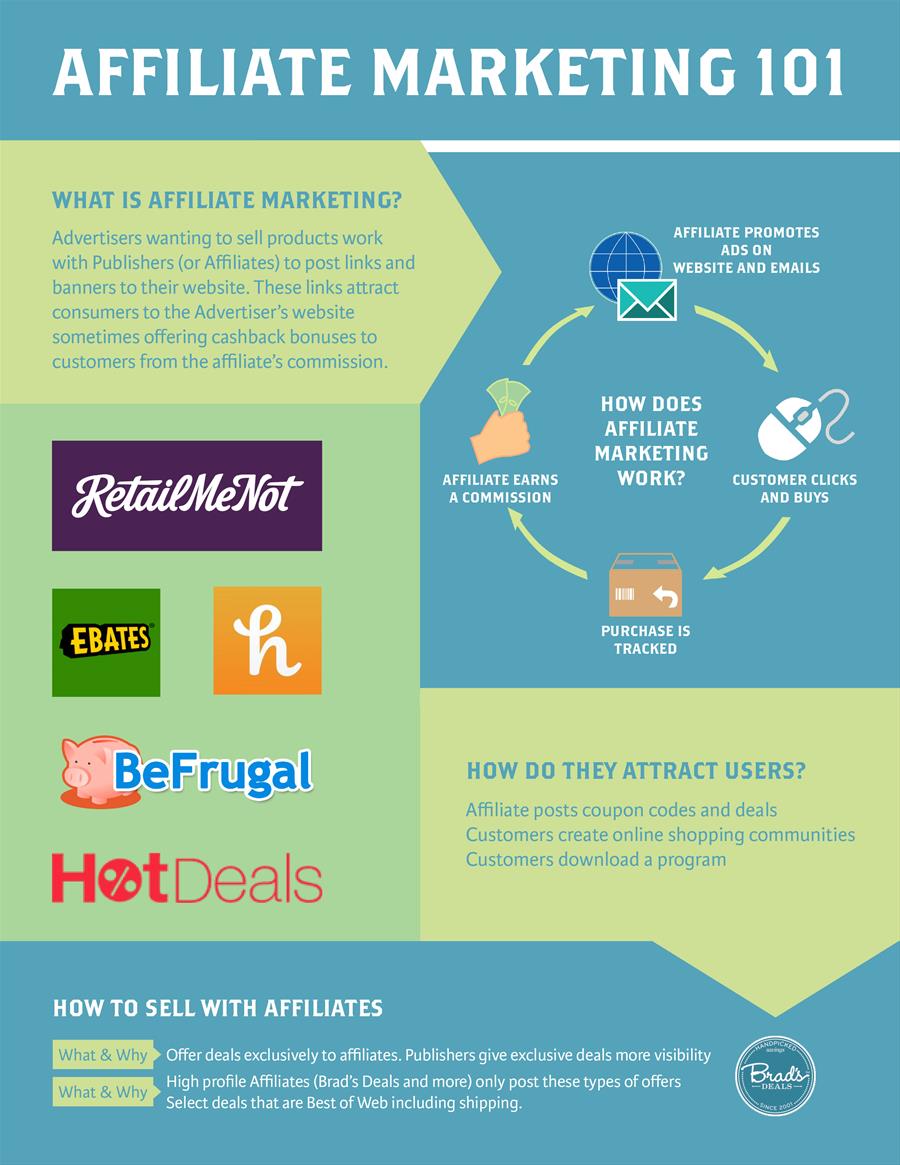Affiliate marketing is all about performance, which explains why it has become a standard for performance-minded marketers. It's one of the fastest growing segments of the digital marketing ecosystem, with more than 80% of marketers now using affiliate strategies to boost their brand recognition, according to Forbes.
Affiliate marketing is when advertisers partner with affiliate companies, also known as publishers, to post banners, deals, coupons, or reviews that link back to the advertiser's website. When those trackable clicks translate into sales for a product of service, the publisher or affiliate earns a commission.
Learn more: Top 10 common affiliate marketing terms you should know.
You may have already experienced affiliate marketing without even realizing it. If you've used the Groupon app or the website Rakuten, for example, you've earned a discount on your purchase and a commission for your affiliate.
In this blog post, we'll explore the following topics and get you prepared to launch or optimize your own affiliate marketing campaigns:
- How does affiliate marketing work?
- Affiliate marketing at a glance (infographic)
- Why affiliate marketing matters
- Getting started with an affiliate network
- What are publisher classifications?
- Types of affiliate marketing promotions
- The habits of successful affiliate marketing programs
- Protecting your affiliate program from fraud
- Getting help with your affiliate marketing
How does affiliate marketing work?
To get started, your business will need to partner with an affiliate network, which is an online management platform that connects advertisers with relevant affiliate companies. (Read more on the specific mechanics of this below).
Advertisers have different business goals, and publishers typically specialize in offering one type of value to their customers (web users), whether that’s a discount, cashback, or comprehensive product reviews. That’s why it’s important that you sign with an affiliate network that aligns with your preferred marketing approach.
Learn more: Explore the different types of affiliate publishers available to you.
Different affiliate strategies you may wish to implement include:
- Awareness campaigns, which deliver a commission to the affiliate every time someone one their site clicks thru to visit the advertiser's website (pay per click).
- Sales campaigns, which withhold commission until that user actually completes a purchase online (pay per sale).
- Lead campaigns, which only pay a commission when a user clicks through to the advertiser's website and requests more information or signs up for something (pay per lead).
Affiliate marketing at a glance (infographic)
Don't have time to read our complete guide? Check out our infographic for a quick reference point.
Why affiliate marketing matters
Affiliate marketing used to be dismissed as just “coupons” or “deals,” but the channel has exploded alongside the rise of mobile shopping. For consumer-facing marketers, it has the potential to grow your business and build long-term loyalty when managed well.
Learn more: Shattering 3 common affiliate marketing myths.
Here are a few more reasons you should consider affiliate as part of your digital marketing mix:
- Strong Return on Investment (ROI): Affiliate marketing is a highly profitable and rapidly growing marketing channel, with studies revealing that it leads to more customers and more revenue. Affiliate customers also spend more on average while online shopping.
- Increased Audience Reach/Traffic: The right publisher can introduce your products to users who might not be familiar with your brand. Affiliate marketing can increase the visibility of your company and drive users back to your website.
- Increased Online/Digital Sales: The discounts offered as part of an affiliate marketing campaign are powerful tools for driving sales, both to specific products and inventory site wide.
- You Are in Control: You affiliate network gives you the ability to choose which products to promote how much of a discount to offer, the commission you are most comfortable with, and more. This allows you to be strategic with your efforts to generate the best return on investment (ROI).
Read about the true value of affiliate marketing here.
Getting started with an affiliate network
An affiliate network is a third party that provides a link between the publisher and your company. Most, if not all, publishers require that you use an affiliate network in order to post your products on their website.
Getting started with an affiliate network is fairly straightforward. Most platforms require a short onboarding or training process, and payment of a monthly fee—typically $25-$75—to access the network's directory of publishers. You can also join multiple affiliate networks to access an even wider world of publishers; Rakuten and CJ are two that Informatics regularly uses.
When selecting a specific affiliate marketing platform, remember that the service acts as the go-between for the financial transaction between advertiser and affiliate, so trust is key. Select a partner that offers reasonable commission rate, reliable tracking, and timely payments.
Each organization will have different needs but to get you started, here are a few things you should consider when selecting an affiliate network:
- Number of Publishers Available in Network
- Transaction Fee
- Setup Cost
- Monthly Fees
- Level of Support Provided
- How Commission is Paid
- Frequency that Commission is Paid
- Commission Approval Length
Some publisher websites are specific to an industry, such as electronics, while others promote multiple categories. Always make sure you set up a sales call with each affiliate network and ask lots of questions.
When selecting a publisher, remember that it's about quality, not quantity. While it would be great to have 10,000 publishers in your program, it's best to have publishers that actually drive sales. Focus your time and efforts on those publishers that promote similar products and have the right consumer base.
What are publisher classifications?
Publishers want to make it easy for you to understand whether or not they fit your business--after all, it's everyone's best interests for the relationship to be profitable. This is why publishers self-designate with a variety of classifications.
Some common classifications include:
- Loyalty: Affiliates who target existing customers with exclusive deals and discounts.
- Content: Affiliate who build high-quality blogs and media about products relevant to their audience. Affiliate purchase links are embedded within that content.
- Social Media Influencers: Personalities who leverage their audience on a social network to promote products and services for advertisers.
- Price Comparison: Affiliates who create comprehensive product reviews, usually in a specific niche. These reviews then link to the advertiser's website.
Learn more: What to look for in your affiliate partner.
Types of affiliate marketing promotions
Not all affiliate marketing campaigns look alike. They should be as specific as your business, with tactics selected to align directly with your immediate business goals. Promotional campaigns you may want to experiment with include:
Site-Wide Promotions: These broad promotions make it easy for consumers to apply a discount to products or services in their cart. The simplicity of this approach is one reason they are the most popular choice amount publishers.
Category-Wide Promotions: These offers narrow down the number of products available for a discount, but still give consumers options to choose from. For example, an online grocery store might offer a category-wide discount on pastas or canned goods. This does not reach as many customers as a site-wide discount, but can help drive targeted sales in desirable areas.
Product-Level Promotions: When a specific item is launching or being discontinued, it's a great time to offer a discount on that specific product.
Take a deeper dive here into affiliate marketing promotion types that can serve your business goals year-round.
You can also explore affiliate marketing tactics that tap into seasonal trends. Overall holiday sales continue to grow in the United States, for example, and you can leverage affiliate marketing to boost your company's revenue during the critical online shopping season.

The habits of successful affiliate marketing programs
Running a successful affiliate marketing program is the opposite of selling a subscription service, where a business aims to "set it and forget it." Your team will need to make regular adjustments and improvements for the affiliate campaigns to be successful, updating your program as frequently as every week. That's why many businesses opt to outsource their affiliate management to a digital marketing firm (like us).
The most successful affiliate programs incorporate five habits:
- Set Measurable Goals: It's impossible to measure your success unless the campaign originate with clearly defined objectives and defined key performance indicators. This should be the first step of any marketing effort, but it's especially important with performance-based marketing like affiliate.
- Test and Analyze Performance: Keep trying new tactics to drive sales, and A/b test your offers. These experiments should measure success using both internal data and information from your affiliate network.
- Recruit Rising Stars: Affiliate publishers constantly rise and fall in the rankings, and you may need to make changes over the course of your affiliate journey.
- Refresh Offers and Creatives: Rolling out new products isn't enough--offers and creative assets also need to offer new opportunities for publishers and customers. Don't let your deals get stale, because customers will quickly gloss over them.
- Build Relationships: Just like any profitable B2B relationship, it will take time to grow a successful affiliate program. Setting an expectation for regular communication can start with personal outreach to publishers before an agreement is signed; once your relationship is established, regular check-ins are an absolute must.
Learn more: Go deeper on the 5 habits of successful affiliate programs.
Protecting your affiliate program from fraud
Unfortunately, there are affiliate publishers out there that can damage your brand through fraud or negligence.
Bad behaviors that must be policed include:
- Publishers posting unauthorized coupons or deals
- Publishers posting fake or expired offers
- Publishers allowing users to publicly re-post codes
Any of these offenses can damage your sales and reputation. Avoid them by monitoring your publishers closely, setting up a regular process for analyzing your campaign results, and by keeping detailed documentation about your campaigns, including:
- Start and end dates
- Website links
- Product-specific SKUs
- Unique coupon codes
Refer to these records when checking to see if your publishers are following through on your agreements.
Getting help with affiliate marketing
With a feature-filled affiliate network like Rakuten or CJ, you may find it easy to enter the world of affiliate marketing, but ultimately difficult to master. For instance, can you ensure your publishers are compliant with different social sites' affiliate rules—Pinterest allows direct posting of affiliate links, while some do not.
The point is, you can do this, but it never hurts to bring in some outside help to really maximize your efforts.
Whether you're new to the world of affiliate marketing, or just need an assists, Informatics' Digital Marketing team is ready to help you build a campaign that pays off. Contact us today!
Ready to revamp your affiliate marketing?
Our Digital Marketing experts are ready to get to work for your brand.

